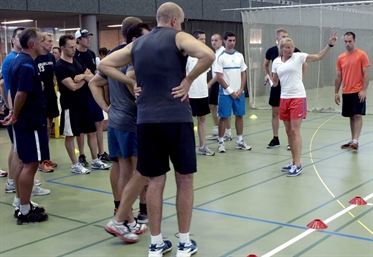Sweating for Sochi
Sweating for Sochi
Top refs, linesmen convene in international camp

 No pain, no gain: top referees and linesmen get their instructions for a fitness test. 32 participants were at the camp competing for 14 spots in Sochi 2014. Photo: Martin Merk
No pain, no gain: top referees and linesmen get their instructions for a fitness test. 32 participants were at the camp competing for 14 spots in Sochi 2014. Photo: Martin Merk
Just as the players coming together for camps in the summer months will have to do, the on-ice officials are battling for their assignment to the 2014 Olympic Winter Games in Sochi.
“We invited top referees and top linesman. It’s the third year we do this, this time for the selection and preparation of the on-ice officials for the Olympic Games,” said IIHF Officiating Manager Konstantin Komissarov.
“They can show us their physical condition and what they did in summer, their ice skating and we can work together on rule interpretation in classroom sessions.”
Opposed to the camps the players participate in, there was little show and no spectators. On-ice officials quietly work in the background. Most consider their performance during a game good when they’re not noticed on the play. Maybe it was fitting that they had their series of fitness tests at a gym called “End der Welt” (German for end of the world) at the Swiss Federal Office of Sports in Magglingen on the hilly Jura landscape.
The fan support came from within the group officials, most of whom have known each other for many years.
“Go, go, go!” – “Allez les bleus!” – “Davai! Davai!”
The cheering was as international as the officials from 12 countries. 17 top IIHF referees from Europe and North America were there and, as a first, also 15 linesmen.
14 refs and 14 linesmen will receive the assignment to the most sought-after event for these officials, the Olympic men’s ice hockey tournament in Sochi 2014. Half of them will come from the NHL, the other half will be top officials from other leagues around the globe like the participants of the IIHF Officiating Camp in Magglingen that ended on Sunday.
Continue reading“It was great to see these people outside of a hockey tournament,” said Swiss referee Danny Kurmann, who has already officiated in three Olympics before. “The camp went over quickly and a big part was sport tests. It was a great opportunity and it’s an honour for everybody to be at this event.”
After the arrival and a teambuilding event, one full day was devoted to off-ice fitness tests. Some of these tests are well-known by players, while others were more specialized on officiating.
Anthropometry, trunk strength, speed and agility, aerobic endurance (yo-yo test) and explosive strength were on the program in the gym.
“We are gathering their values to create their individual fitness programs,” said Andrea Zryd, a sport scientist and sport teacher based at Switzerland’s sport centre who works also for the Swiss Ice Hockey Federation.
“The guys are really in shape. We had a test three years ago and I think they are better now.”
There was lot of sweating in the gym but the officials – as indicated on special T-shirts – have a dream. And they know they have to perform well on and off the ice to make it come true.
“Much is demanded from us here but it’s worth it,” said Daniel Piechaczek, who knows camps like this from last year with the IIHF or similar camps from his native Germany. “If you show top performances you may have the chance to officiate at top events. The dream of everybody here is of course to go to Sochi. Just to be here among these participants is an honour and later we will see who gets to call the games.”
For others this camp was a new experience like for French linesman Pierre Dehaen, who had a trainer to prepare for the camp and talked to IIHF.com after surviving the yo-yo endurance test the longest.
“I prepared well for this camp because it’s very important in view of the Olympic Games,” Dehaen said. “Last season I did the World Championship quarter-final Canada-Sweden, which is a great experience for a French official. I hope it will be similar or even better for me next season.”
The participants also got to know all administrative procedures on the way to Sochi on top of classroom and video sessions.
“What I saw is that they worked hard and came in shape,” said IIHF Officiating Manager Konstantin Komissarov. “We appreciate that they took it very seriously both those who work full-time as referees and those who do it beside a regular job. At a level of play like in Sochi officials must be in good, athletic condition close to the players’.”
Magglingen seems to be far away from the everyday hockey life, although from the terrace of the buildings the visitors were able to enjoy a nice view down to the next city, Biel. Some 2,500 kilometres further to the east comes Sochi, the ultimate goal of the camp participants.
Going down to the valley with the funicular to Biel, one is not too far away from the ice rink of the German-French bilingual city where EHC Biel plays its games in the Swiss National League A. Some more work waited there for the officials.
On the ice the officials did the pylon test and the five-8. The linesman had another one focusing on the four-man system while the refs did the special shuttle and were tested on puck-drop techniques.
Only 14 of these 32 men will receive the good news in December that they can go to Sochi.
In the meantime the NHL will have its own selection process starting with the camp and ending based on the performance in league play. Four NHL representatives were on-site in Switzerland to meet their IIHF counterparts, observe the camp and also give their inputs.
“I’ve been going to such camps in Europe for many years and they’re well organized, but the last couple of years I noticed a great transformation with the officials they’re bringing to these camps. The fitness levels are where they need to be, they’re athletes. That’s their approach now,” said Terry Gregson from NHL Officiating.
“The average ages drop which is always a good sign too in the long run. Across the world officiating is getting to a similar standard. We’re having some sort of cross-cultures of hockey now. It’s important that everybody officiated the same way.”
One important change in this direction was the adaption to the four-man system that is now used in top leagues in Europe and at the top IIHF events in men’s ice hockey. In the NHL the system with two refs and two linesmen goes back to 1997. That’s why Gregson had a lot to share with the European officials.
“We talk a lot about positioning, sidelines, how to work with the teams. We try to pass on our experiences,” he said.
Apart from that he and his colleagues may also keep their eyes open for European talent after Swede Marcus Vinnerborg became the first European referee before returning to Europe after two seasons.
“When I hired Marcus to the National Hockey League a lot of people were surprised but I had the chance to watch Marcus three years and in the Vancouver Olympics. At the Olympics we can compare them with our officials,” Gregson recalled.
“Marcus worked for us for two years but also found out that it’s a very difficult lifestyle because you travel all the time and you’re away 105 nights per season and if you’re really good even more because you’re going to go further in the playoffs. The hockey atmosphere is probably also a bit more aggressive over there. To make the NHL you first need to be a good official but you also need to commit to the lifestyle and competition. We’ll certainly give some guys who are here a good look and I’m sure some of them would be good officials on our team.”
The main focus right now for the NHL’s officiating management will be the preparation of the season.
The 77 on-ice officials in the NHL will soon convene for a week-long training camp before officiating exhibition games in the second half of September. Their performances in this time and in the first two months during the season will be crucial to determine who will be selected on the NHL side to call the games of the hockey world’s pinnacle event in 2014.
Back to Overview











































